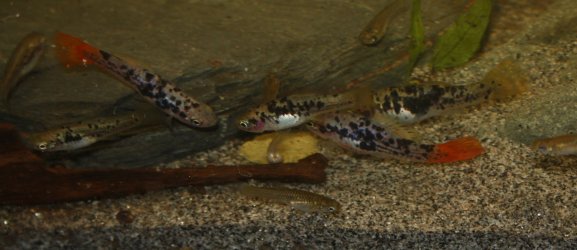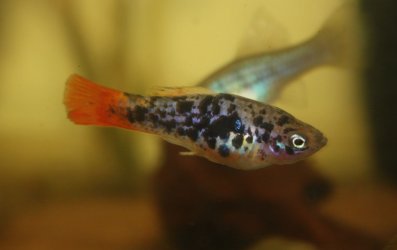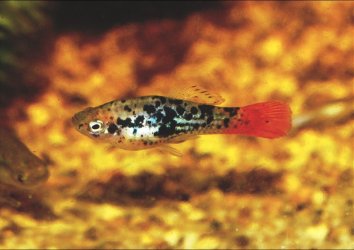You are using an out of date browser. It may not display this or other websites correctly.
You should upgrade or use an alternative browser.
You should upgrade or use an alternative browser.
A beautiful wild platy strain
- Thread starter emeraldking
- Start date
cool fish with interesting patterns!Xiphophorus variatus La laguna...
A wild platy species...
You won't find them at an lfs...
View attachment 311947View attachment 311948View attachment 311949
xxEMOxLIZZARDxx
Fish Crazy
Pretty!
Very nice. All I ever see is orange ones and orange wags . Sometimes a pale yellow orange type.
I am not jealous. No, not at all. Jealousy is not in my character.
Now, being honest, how does that form do with cancer? There are a lot of dark spots, and I remember my helleri and montezumae wild types. I've never read up on variatus platys and that issue.
Now, being honest, how does that form do with cancer? There are a lot of dark spots, and I remember my helleri and montezumae wild types. I've never read up on variatus platys and that issue.
A wild type that needs no improvement as far as looks go 
What's sold at stores of variatus platies are mostly the orange ones and the socalled hawaii platy. But those are breeding forms. There are more interesting wild forms of the variatus platy that look stunning.Very nice. All I ever see is orange ones and orange wags . Sometimes a pale yellow orange type.
Well, those with a lot of black spots are still vulnerable to develop melanoma. Especially specimens with a high density of melanophores at a certain spot on the body. So, also variatus platies are not excluded from skin cancer.Now, being honest, how does that form do with cancer? There are a lot of dark spots, and I remember my helleri and montezumae wild types. I've never read up on variatus platys and that issue.
I deliberately posted this to show that not all wild forms are pale in coloration. Or let's say, less colorful.A wild type that needs no improvement as far as looks go
Just like guppies, it depends on the location of their habitat wether they have to deal with predation, less predation or none predation to show more intense coloration or not. But with wild platies in free nature, each population has multiple phenotypes when it comes to color and pattern. And it doesn't matter if we are speaking about wild platies like maculatus, variatus, evelynae, couchianus, gordoni, meyeri, xiphidium, andersi platies, etc... There will always be some difference in phenotype. If we wanna control certain traits of such a population, we need to decrease the number of specimens first and select the desired ones. And linebreed them until it breeds true.
I once received one badly damaged male variatus from a Mexican friend. No females, and it didn't live long, so it fits the usual profile of the mystery fish that got away. It was an apricot coloured fish that was one of the best looking livebearers I had ever seen. It was bought from a feeder tank in a Mexico City market....
Livebearer lovers have no idea what they are missing by allowing themselves to be channelled into the same old fish in stores. in general, as a hobby, we are poorly served by the industry, but with livebearers, it really jumps out.
When I was a kid, platy tanks were fantastic sources of very beautiful old linebred strains, as well as close to wild type fish. It is sad that we have largely lost that choice and diversity in North America.
Livebearer lovers have no idea what they are missing by allowing themselves to be channelled into the same old fish in stores. in general, as a hobby, we are poorly served by the industry, but with livebearers, it really jumps out.
When I was a kid, platy tanks were fantastic sources of very beautiful old linebred strains, as well as close to wild type fish. It is sad that we have largely lost that choice and diversity in North America.
Well, overhere in Holland a lot of wild species of livebearers have vanished from the aquarium scene through retail. Back in the 1970's and 1980's, there were way more available overhere. But the breeding forms won from the wild forms through retail sale. But nowadays, also Western European wholesalers are aware of it that the demand for wild livebearer species is growing. And a number of them are seeking for private breeders who can provide them with such livebearers for the past couple of years. So, on a regular basis those wholesalers are offering some wild livebearer species to the retail.




